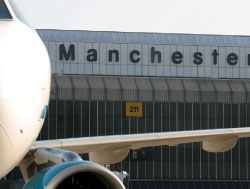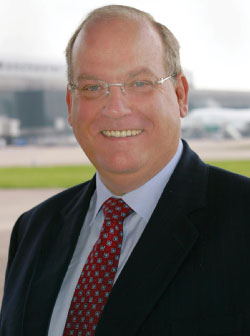
Muirhead: “In the medium to long-term, we believe that Manchester airport has untapped market potential with West Coast US, Far East and Indian destinations.”
As the economic climate continues to challenge the aviation industry, Muirhead emphasised that no airports are immune from the global downturn. While regional airports have been hit harder, hub airports are better protected against falling passenger numbers because they have fewer marginal routes, he said.
The chain-effect, he went on to explain, extends not only to business partners, including retailers and airline partners, but can also be seen as routes and frequencies are reduced, major consolidation occurs and employment opportunities shrink.
Outlining how the industry can help its own recovery, Muirhead places the environment and sustainability at the top of the Group’s agenda. “The industry must gain permission to grow through a long-term commitment to sustainable development. We have a unique opportunity to demonstrate that aviation will play a crucial role in the economic recovery but this can only be fully realised if the entire industry commits to a genuine sustainability agenda.”

Muirhead: “We have a unique opportunity to demonstrate that aviation will play a crucial role in the economic recovery but this can only be fully realised if the entire industry commits to a genuine sustainability agenda.”
MAG will deliver long-term sustainable growth through its customer preposition – working with its partners and delivering customer-focused investments including redeveloping terminals and new security technologies, Muirhead explained. “We believe this remains the correct long-term direction but we do have to deal with the impact of the global economic climate and support our partners in their own attempts to ride the storm,” he said. “We are constantly seeking to reduce our cost base through deferred capital expenditure and driving efficiencies across the Group. That said, we will continue to invest in improving the customer experience and achieving our carbon neutral airports ambitions by 2015.”
Muirhead is confident that the Group is well on target to achieve its carbon commitments, particularly at its largest airport, Manchester. This commitment is underpinned in the airport’s community and ground transport plans, which inform its sustainability strategy. “We will deliver this target through a combination of reducing energy demand and obtaining energy from renewable sources both on and off site and offsetting,” he said.
The launch of Airport Carbon Accreditation at the ACI EUROPE Annual Congress taking place in Manchester is timely. Manchester airport has already participated in the pilot phase earlier this year and MAG has since committed to sign up all its airports. Muirhead commented: “We fully support it because we believe it is the first time that airports have the opportunity to adopt a joined up approach to tackling climate change.”
Manchester airport
A £35 million (€40m) major redevelopment programme to include new airside shopping facilities for Terminal 1 and new retail and security facilities in Terminal 2 is still underway, with completion expected in time for this summer. The project has resulted in two new terminals being created within the existing buildings and with minimal disruption, explained Muirhead.
Manchester airport’s master plan to 2030 sets out the importance of enhancing the capacity of the airport’s existing infrastructure – in line with the UK government’s 2003 White Paper. “Enhancing capacity is critical to ensuring that our operation at Manchester is as efficient as possible and the redevelopment of the terminals plays a big part in this,” said Muirhead.
The projects revert to the Group’s customer-driven preposition. Muirhead gave an example of how the redevelopment of T1 to support the relocation of Emirates from T2 has given the carrier an opportunity to grow from Manchester, where the airline now has a new executive lounge. “Our key objective for the redevelopment projects is to make the customer journey easy,” he said.
Rather than a focus on growing new routes, Muirhead explained that the current focus is to support carriers in improving and maintaining load factors on their existing route network. “In the medium to long-term, we believe that Manchester airport has untapped market potential with West Coast US, Far East and Indian destinations,” he said.
As an important secondary hub for many charter and budget carriers, Muirhead expects the no-frills sector to play an important role in increasing traffic. “Our pricing policy, catchment area, partnership approach and quality facilities make services from Manchester airport an attractive proposition for no frills carriers.”
East Midlands airport
The opening of a new, low carbon pier building at East Midlands is keeping pace with the Group’s ambitious strategy to achieve carbon neutrality by 2015. Growth in the medium-term will come from its key operations, said Muirhead. “We expect East Midlands airport will continue to see growth in the core European, no frills market in addition to longer haul destinations.”
Bournemouth airport

At Bournemouth airport, a £45 million (€52m) redevelopment is underway to improve the passenger experience.
At Bournemouth airport, a £45 million (€52m) redevelopment is underway to improve the passenger experience. Beginning in 2007, the ongoing works include an extension to the terminal, security facilities, a new check-in hall and additional car park facilities.
In December, the airport began operating from an interim departure lounge, covering an area of 1,500sqm, with a larger tax-free shop, new food and beverage (F&B) offerings, seating for approximately 500 passengers and four departure gates. “The programme is on time and within budget,” said Muirhead.
Humberside airport
As the airport hardest hit in the Group’s portfolio, passenger numbers are likely to be 10% down, Muirhead explained. “Humberside has been affected substantially by the economic downturn largely on the back of a major consolidation of the charter business.”
In December, MAG announced it was retaining its 82.7% majority shareholding in Humberside airport, as part of a strategic review, which included a possible transfer of ownership. “The Group decided that given several positive developments recently at Humberside airport and the current economic climate, retaining its majority stake as part of MAG was the correct course of action,” said Muirhead.
There is confidence across the Group that Humberside is a viable choice for passengers in the local catchment area, as well as helping to support other economies. “Turkey is particularly strong this year because the non-Euro zone holidays have become more popular due to the exchange rate. The four-times-daily KLM service to Amsterdam-Schiphol gives Humberside a route to the rest of the world. Added to that are Eastern’s flights to Aberdeen, which support the oil industry, and the second largest airport-based heliport in the UK,” said Muirhead.
As shortlisted bidders for London-Gatwick, acquiring new airports would be a further important step for the Group in its pursuit of long-term growth. “We have consistently stated that the Group is interested in acquiring assets that will add value for our shareholders and this could include one or more of the BAA airports,” said Muirhead.







